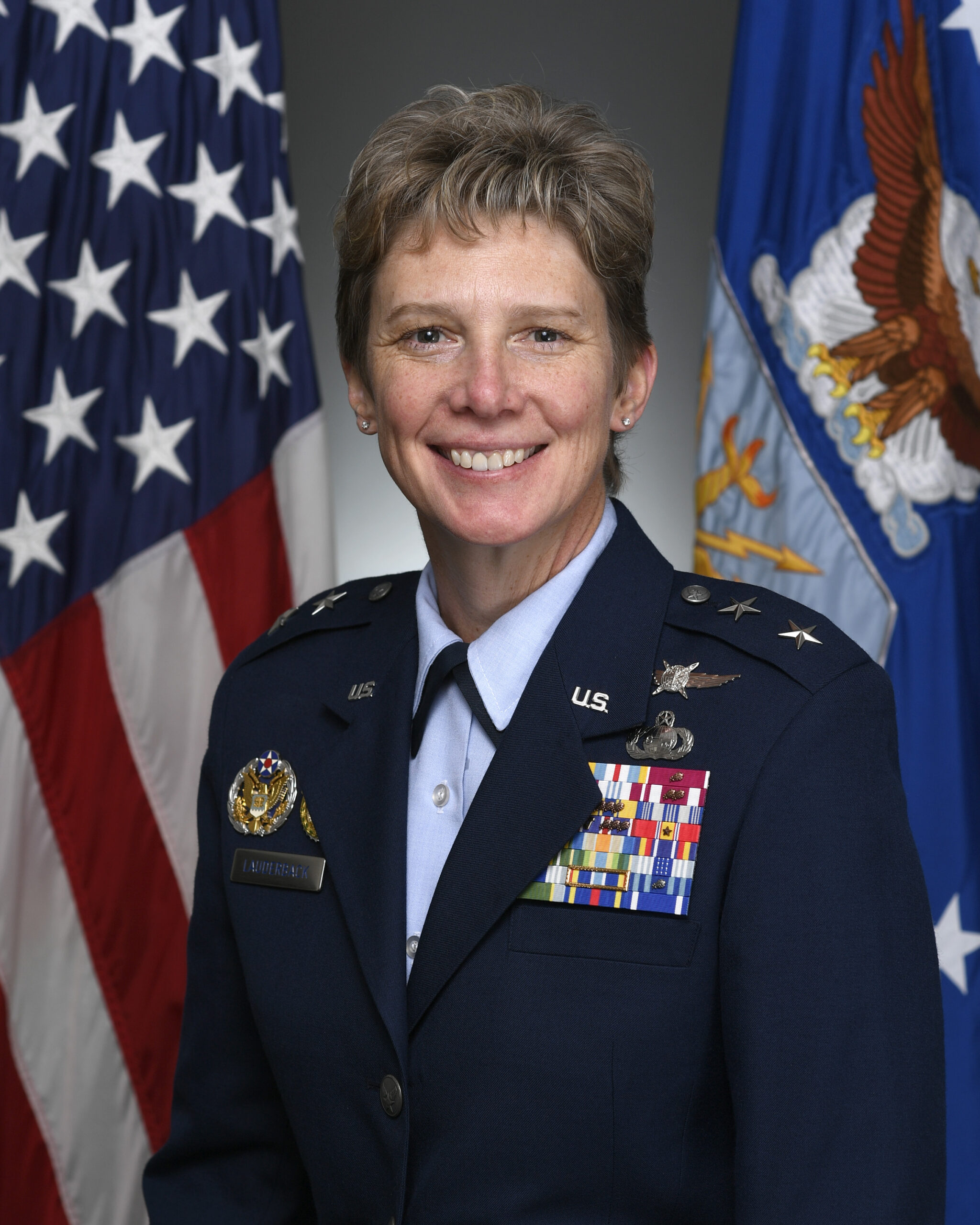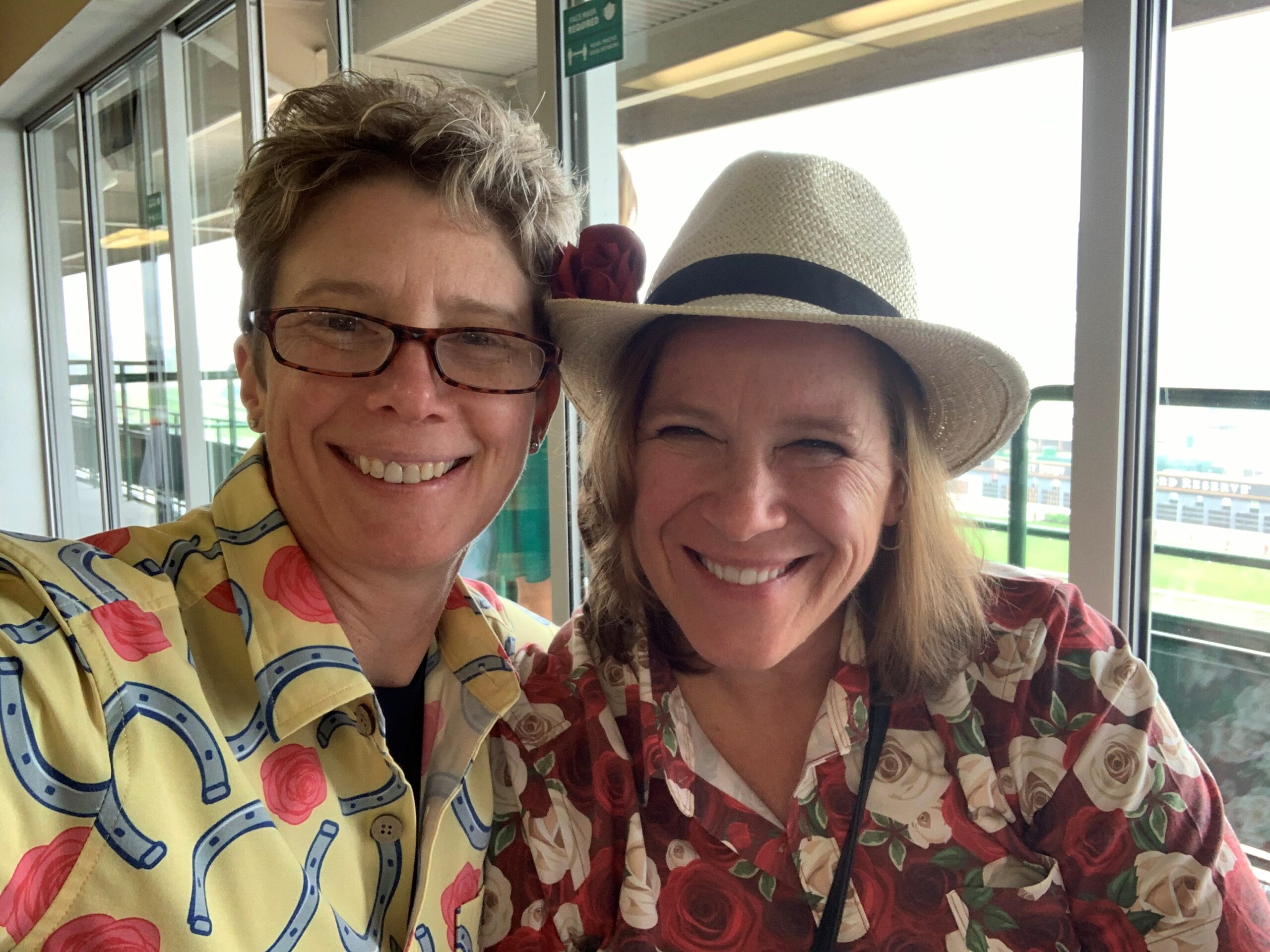By Emily Starbuck Gerson
Since Major General Leah H. Lauderback commissioned into the Air Force in 1993, she has found success and broken through barriers as a woman and member of the LGBTQ+ community.
As she climbed through the military ranks, she was also forced to sacrifice a huge part of her identity. She came out as gay to some trusted friends in 1997, but with the Don’t Ask Don’t Tell policy in place, Lauderback was unable to bring her true self to the mission and had to hide huge aspects of her daily life until the policy was repealed in 2011.
After the repeal, once Lauderback was allowed to live authentically both in and out of uniform, she further excelled in the military, earning medals and receiving promotions. In 2020, she became a Major General — a rank that’s attained by less than 1% of Department of the Air Force officers.
She recently transitioned to the Space Force, where she serves as Director of Intelligence, Surveillance, and Reconnaissance at the Pentagon.
Despite the repeal of Don’t Ask Don’t Tell a decade ago, and the trans military ban earlier this year, Lauderback realized there were many LGBTQ Airmen and Guardians facing challenges. So earlier this year, Lauderback co-founded the LGBTQ Initiative Team (LIT), a Barrier Analysis Working Group (BAWG) within the Department of the Air Force. Lauderback is the organization’s military officer champion, and with a diverse array of Airmen and Guardians participating, she leads the organization to assess barriers and make positive changes for the community.
Modern Military Association Association: What was it like serving under Don’t Ask, Don’t Tell and not being able to bring your whole self to your work?
Major General Leah H. Lauderback: After coming out in my small social circle in 1997, I lived under the policy of Don’t Ask Don’t Tell for 14 years. I have firsthand knowledge of what it means to work in a non-inclusive workforce and would describe that as personally challenging, upsetting, and demeaning.
I continued to serve in the Air Force because I loved my job and the people I served with; however, I put my desire to serve the nation above my desire to live a normal life. Instead of being my true self, I hid, I evaded questions, and I was untruthful at times — of simple things such as describing my plans for the weekend.
My private life and relationships were stressed, there was a lack of support for my “family,” and I was clearly not the best officer I could be. Other than being completely paranoid for a number of years, I don’t think I noticed the stress of it all until I reflected on it years later. Imagine separating your personal life completely from your professional life — and in the military, we consider all of us to be family. We know in the Air Force that if you recruit a member, you’re actually recruiting their family too. So then to think that I had to hide everything about my family life, that was tough!
As an officer and leader in the Service, we also want to take care of our subordinates. That’s tough to do when they can’t tell you everything going on in your life, and that I couldn’t provide my own personal stories for them to learn from, or I risked outing myself.
MMAA: How did you feel when you were able to come out after the repeal, and was it difficult to adjust to being out and open?
LL: I felt relieved as a heavy weight had been taken off my shoulders. My initial reaction on the day of the repeal was sharing texts or emails with friends and crying. I truly did not think I would see the repeal during my career.
It was not difficult to adjust for me; I still didn’t plan to come out to everyone all at once, but I was outed in a very public sense three years later when I took command of an Air Force wing. The local media took my story of being the first gay commander of the unit and the story went public on social media — not the attention that I ever cared for, but after that time I realized there was no hiding it anymore!
A quick story on adjusting though, and thankfully I learned this lesson quickly: for years I told people I was single and hid my relationship status. My default answer when someone asked if I was married was, “No, I am single.”
Fast forward to a conference I attended after the repeal, and another participant asked about my relationship status. I went with the default, as it just naturally came out of my mouth. The horrible part of this story is that I actually had just gotten married a week or two before! I felt terrible with guilt and embarrassed that I had just lied to this person, so the next day at the conference I corrected my story and apologized to the person — AND to my wife.
MMAA: What are some challenges and rewards you’ve faced as a female and lesbian serving in a senior leadership position?
LL: My coming out in 2013 to my co-workers and bosses was a wonderful experience — I would consider that a reward due to my rank of Colonel at the time.
I was challenged a bit with coming out to co-workers on deployment a few years later, as all of my peers were men, older than me, and most served in the Army, so I was uncertain of how they would react. Each Friday the Commanding Officer led “News from Home” at dinner, in which we would share stories of our families with all of the other General Officers at the table. I spoke about my wife and our two cats as often as I had a story to tell. Those Generals never batted an eye and always supported me.
While it was uncomfortable at first, I will always fondly remember the Commanding Officer who made it easy to be accepted. Overall, my experience coming out after DADT repeal was so positive that I was uncertain if anyone was having a negative experience.
MMAA: Why did you think it was important to recently form LIT, a DAF BAWG for the LGBTQ community?
LL: At first I was unsure if it was necessary, given that my experiences coming out after DADT were all positive. I wasn’t certain there were issues for the LGB community, though I knew the conversation for the transgender community was very different. A few of my “family” peers came together in the fall of 2020 to discuss if a working group was needed.
I also spoke with a number of LGBTQ members who all provided me with their stories and what was stopping the Air Force and Space Force from being inclusive of the community. It turns out there are a lot of things we can do in the Air Force and Space Force to make positive change, ranging from awareness of our typical use of gendered language, to educating the medical profession of some unique LGBTQ needs, to providing a group for community members to reach out to for advice and mentoring, among many other items. Our LGBTQ Initiatives Team (LIT) is exploring all of these lines of effort to get after making the Services more inclusive.
MMAA: With DADT and the trans service ban no longer in place, it may appear on the surface as though the LGBTQ community has equality in the military. What are some of the key issues you think still need to be addressed?
LL: Change in any organization needs to be addressed in at least two ways: 1) policies and 2) “hearts and minds.” DADT and the transgender ban are evidence of policies that have been lifted, which is a great way forward, but it does not immediately address “hearts and minds.”
The LIT will help out in both ways. Given our grassroots forum for members to identify issues, we will be able to make recommendations at the highest levels of the Department of the Air Force to change policy. This includes potentially revising the latest transgender policy as we see how it plays out at the individual level. I’m certain we will identify areas that still need revising; however, I would also say we’ve taken some huge steps forward.
While a policy only gets you so far, the LIT also will identify ways to address changing hearts and minds through awareness, training, or other avenues. I think we all learn about these issues and each other through discourse, and it is okay if those conversations are uncomfortable. For our transgender community, we still have plenty of conversations in front of us and more work to do.
MMAA: From the perspective of a senior leader, why do you think it’s important for marginalized communities, such as LGBTQ, to have a sense of community within the military?
LL: Diversity and inclusion is not just a phrase — it is a mission to me. Diversity is essential to our future success and security of the nation. There is a wealth of data showing diverse teams are more innovative, better problem solvers, and are less prone to groupthink. Inclusion is what allows our workforce to stay diverse.
To be inclusive, the organization actually needs to take active measures to make the workforce feel belonged and encourage those marginalized communities to stay. The military is an all-volunteer force — we don’t have the luxury to build a diverse team and then expect to retain people even though we treat them unequally. The Department of the Air Force recognizes the importance of this inclusion and thus we have established the Office of Diversity and Inclusion under the Secretary of the Air Force.



